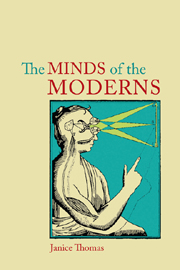Book contents
- Frontmatter
- Contents
- Acknowledgements
- Abbreviations
- Introduction
- I Descartes
- II Spinoza
- III Leibniz
- 11 Is the mind a substance for Leibniz?
- 12 Self-knowledge and the monads
- 13 Leibniz on consciousness and unconscious perceptions
- 14 Leibniz and the problem of mental causation
- 15 Leibniz and representation
- IV Locke
- V Berkeley
- VI Hume
- Conclusion
- Bibliography
- Index
15 - Leibniz and representation
from III - Leibniz
- Frontmatter
- Contents
- Acknowledgements
- Abbreviations
- Introduction
- I Descartes
- II Spinoza
- III Leibniz
- 11 Is the mind a substance for Leibniz?
- 12 Self-knowledge and the monads
- 13 Leibniz on consciousness and unconscious perceptions
- 14 Leibniz and the problem of mental causation
- 15 Leibniz and representation
- IV Locke
- V Berkeley
- VI Hume
- Conclusion
- Bibliography
- Index
Summary
One of Leibniz's more striking ideas is that the model in terms of which a genuinely unitary substance should be understood is the individual conscious subject with its entirely unique point of view or perspective on reality. If we mistakenly think of individual substances as identical, minutely small, bits of matter – the building blocks of material bodies – we are bound to misunderstand them. All physical things can be divided and divided ad infinitum: they are all entities by aggregation with, at best, only quali-fied claim to genuine unity. They are thus not substances. In sharp contrast, monads or simple substances as Leibniz views them, all have the indivisibility and unity we know from our own immaterial substance. They have substantial and fundamental similarity to our minds: monads all have innumerable perceptions (or “expressions” or “representations”) of the whole universe and they are all unique because each has its own distinct point of view on all the rest.
They are also all – even the barest entirely unconscious monads – moved to spontaneous activity by the force of their intrinsic unfolding appetites or desires. As we have seen in the case of the monads that are near the top of the Leibnizian hierarchy, animal and human dominant monads act through organic bodies, which result from the close correspondence existing among aggregates or clusters of more basic monads.
- Type
- Chapter
- Information
- The Minds of the ModernsRationalism, Empiricism and Philosophy of Mind, pp. 132 - 138Publisher: Acumen PublishingPrint publication year: 2009

